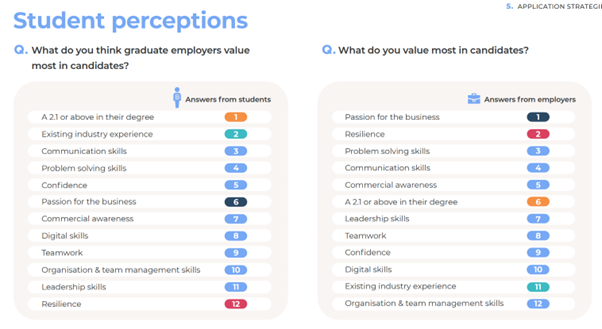Claire Guy is Employability and Careers Consultant with the University of Exeter Business School.

Many international students have never seen a cover letter before. Lots of countries don’t use them, or if they do, they are not an important part of recruitment.
Why write a cover letter?
In the UK, jobs for graduates are competitive. There are many students competing for jobs. Cover letters are a way that you can “stand out”. Cover letters can impress an employer and show your enthusiasm and motivation for the job.
Motivation and enthusiasm are very important to UK employers. Research shows that motivation and enthusiasm might be the most important thing to an employer.

From What Do Graduates Want 2022-2023 – Research by Bright Network
What should a cover letter contain?
A cover letter should explain 3 things: 1) why you want this job role 2) why you want to work for this company and 3) a brief explanation of your experience / skills in relation to the role. Remember that your CV explains all your qualifications, skills and experiences. To create a strong CV you must tailor the content to match the qualifications, skills and experiences that the employer has asked for in the job details. If you have tailored your CV correctly, you will have explained how you are a good fit for the job. This leaves your cover letter to explain in detail why you want the job and why you want to work for them.
What if an employer doesn’t ask for a cover letter?
Not all employers ask for cover letters. If they don’t ask for one, you don’t have to send one, but you still could! Remember, the cover letter is your opportunity to stand out and show how enthusiastic and motivated you are for the role and the company.
5 mistakes that international students make in their cover letters
1 Not using the correct format of a UK business letter. Employers are assessing your ability to write a formal letter. It is likely in your job that you will write letters to customers or clients. Employers want to know you can do this in a professional way. Search online for “business letter format UK” and you will find examples how to set out a letter correctly.
2 Writing statements like “I want to work for a well-known, global company with a great reputation”. This may be true, but it is too vague to be meaningful. A company wants to believe you genuinely want to work for them, and not just any company. You can show you genuinely want to work for them by telling them things you know about the company. This means doing a little bit of research. Once you know how to do this, you will be able to do the research required in 5-10 minutes. A) Visit the company website. B) Find something you like about them. Something that makes you say “wow” or “oh!”. Something that makes you feel good about the company. It may be an award they won. Or that they let staff have 3 days per year to volunteer. Or their sustainability strategy. Find something that matters to you. That connects to you in some way. C) Write about what you found in the cover letter, and be very specific. Whatever you write should only be true for this company.
“All students want a job where they can develop skills and grow a career! You need to think much more deeply about why you want this specific job role. Why do you want to do this job? Which of the tasks in the job description do you really like? Why?”
For example: “CMG won the RedField award in 2021 and 2022, for your focus on sustainability in your office supply chain. I did a module on sustainable supply chains which I found fascinating and it really convinced me of the importance of a sustainable approach. I’d love to work for a CMG who is doing such a good job of this”. Much stronger and more impactful than “I like that CMG is interested in sustainability”.
Top Tip: start with the “About us” or “Our values” or “Our History” section of a company website. You may have to scroll to the very bottom of the page to find it.
3 Writing statements like “I want a job role where I can develop my skills and grow my career”. I know you care deeply about your own development. Many employers will care too, but a statement like this will not make you stand out. All students want a job where they can develop skills and grow a career! You need to think much more deeply about why you want this specific job role. Why do you want to do this job? Which of the tasks in the job description do you really like? Why? What is it about being a (insert your preferred job role here) that motivates you?
DON’T write: “I’m thinking about project management because it seems like a good fit for my skills. It sounds like an interesting career. I think it would be a good challenge. I’m keen to get some experience and start on a career path.”
Write this instead: “I want to be a project manager because I find leading people, deadlines and resources really motivating. During university I found creating a work plan with time limits and then tracking my progress against the plan really enjoyable, especially when the plan involved other people. I’ve enjoyed helping clients whilst working in retail, so adding my interest in projects with wanting to please the client appeals to me.”
Top tip: This might take a lot of thinking about to get to your real reason why you are interested in the role. use www.prospects.ac.uk/job-profiles/ to understand more about the job you are applying for. Another way to get a good answer is to keep asking why, like this; I want to be a consultant. WHY? Because I want to have a job which is interesting? WHY? Because I like variety WHY? Because I enjoy doing different things each day WHY? I like meeting different people and solving new problems… and so on.
4 Using overly formal language. Most countries have their own style of Business-English. Many countries use words that are now considered a bit old-fashioned in the UK. Avoid phrases like “your most esteemed company” “I would be honoured to join your respected company”. These phrases may be commonly used in your home country, but in UK culture they feel a bit insincere, and like empty flattery. Instead, find facts about the company that appeal to you. Such as “HGR has 20 million customers across 13 countries. I’m keen to work for a company that provides a quality service which is valued by its customers.”
5 Including information that belongs in your CV. Your CV and cover letter do different things.
CV = how your skills, experiences and qualifications match the job role.
Cover letter = why you want the job and why you want to work for this company plus a BRIEF summary of how you match the role.
Your cover letter should only contain a brief description of skills, experiences or qualifications that match the job role. Why not read our blog 5 mistakes international students make in their UK CVs to improve your CV?
Want more advice about cover letters? Find out what help Career Zone provides with cover letters including workshops, online resources and this handy guide.
